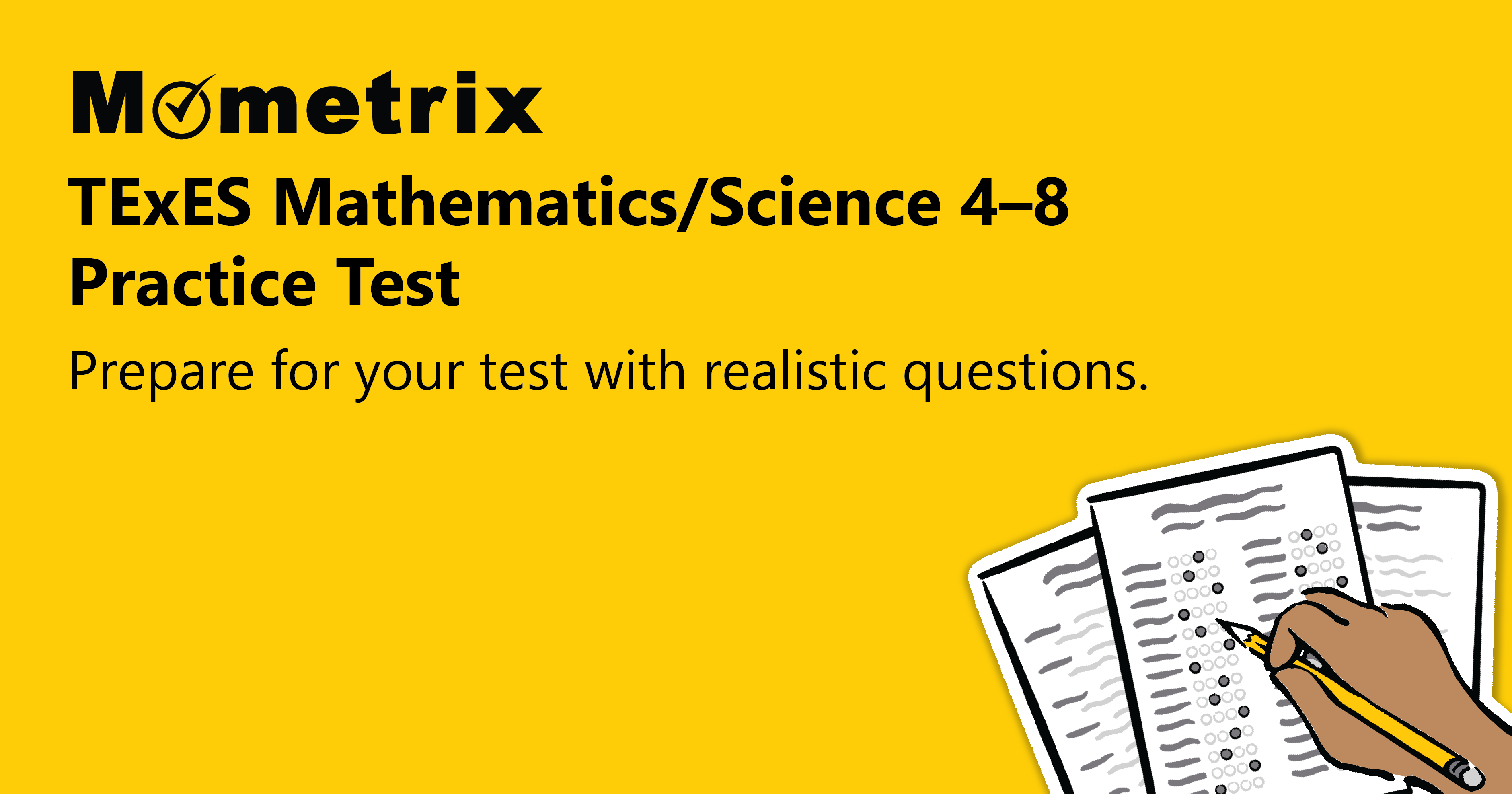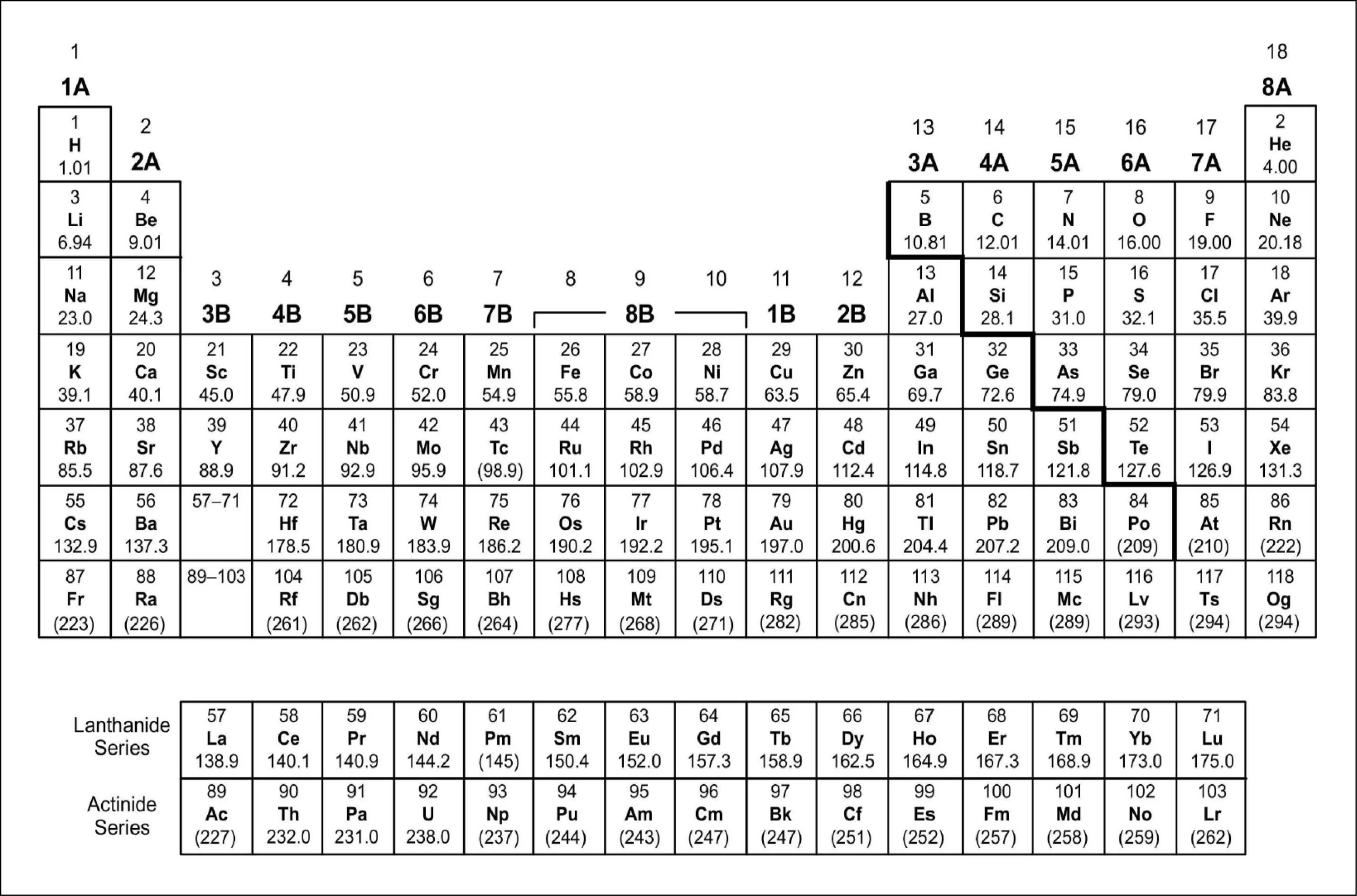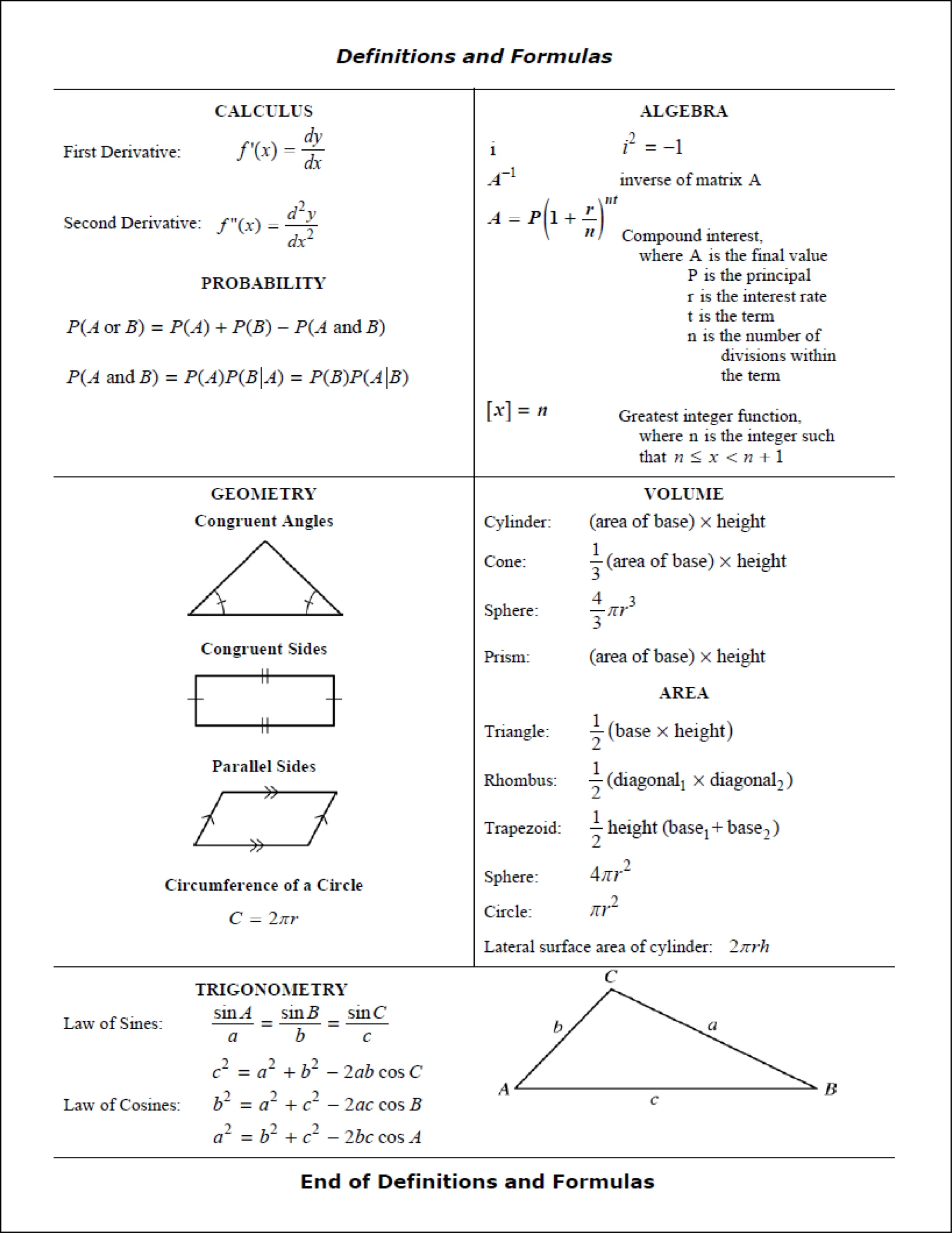The Texas Examinations of Educator Standards (TExES) Mathematics/Science 4–8 exam is used to assess the skills and knowledge of prospective entry-level math and science teachers for 4th-8th graders in Texas public schools.
Click “Start Test” above to take a free TExES Mathematics/Science 4-8 practice test, and check out our premium-quality TExES test prep resources by clicking the links below!
Exam Outline
The TExES Mathematics/Science 4-8 exam contains a total of 120 selected-response questions, and you will be given 4 hours and 45 minutes to complete it.
Teaching Standards
The exam is aligned with the 19 standards for educators that have been outlined by the State Board for Educator Certification.
Click the button below to see the full list of approved educator standards:
Mathematics Standards
- Number Concepts: You are expected to understand and use numbers, number systems and their structure, operations and algorithms, quantitative reasoning, and technology.
- Patterns and Algebra: You are expected to understand and use patterns, relations, functions, algebraic reasoning, analysis and technology.
- Geometry and Measurement: You are expected to understand and use geometry, spatial reasoning, measurement concepts and principles, and technology.
- Probability and Statistics: You are expected to understand and use probability and statistics, their applications, and technology.
- Mathematical Processes: You are expected to understand and use mathematical processes to reason mathematically, to solve mathematical problems, to make mathematical connections within and outside of mathematics, and to communicate mathematically.
- Mathematical Perspectives: You are expected to understand the historical development of mathematical ideas, the relationship between society and mathematics, the structure of mathematics, and the evolving nature of mathematics and mathematical knowledge.
- Mathematical Learning and Instruction: You are expected to understand how children learn and develop mathematical skills, procedures, and concepts, as well as typical errors students make.
- Mathematical Assessment: You are expected to understand assessment, and use a variety of formal and informal assessment techniques appropriate to the learner on an ongoing basis to monitor and guide instruction and to evaluate and report student progress.
Science Standards
Standard I: You are expected to manage the classroom, field, and lab activities to ensure student safety and the ethical care and treatment of specimens and organisms.
Standard II: You are expected to understand how to use materials, technologies, equipment, and tools correctly.
Standard III: You are expected to understand scientific inquiry and its role in science instruction.
Standard IV: You are expected to have practical and theoretical knowledge about teaching science and how students learn science.
Standard V: You are expected to know the appropriate assessments to monitor the learning of science.
Standard VI: You are expected to understand the history and nature of science.
Standard VII: You are expected to understand how science affects daily life and how science interacts with societal and personal decisions.
Standard VIII: You are expected to understand the science content appropriate to teach physical science in the state of Texas.
Standard IX: You are expected to understand the science content appropriate to teach life science in the state of Texas.
Standard X: You are expected to understand the science content appropriate to teach Earth and space science in the state of Texas.
Standard XI: You are expected to know the unifying processes and concepts that are common among all sciences.
Exam Domains
The exam is split into 11 domains, each of which covers one or more of the standards mentioned above.
| Domain | Percentage of Exam | Standards Used |
|---|---|---|
| 1. Number Concepts | 8% | Mathematics I |
| 2. Patterns and Algebra | 11% | Mathematics II |
| 3. Geometry and Measurement | 11% | Mathematics III |
| 4. Probability and Statistics | 8% | Mathematics IV |
| 5. Mathematical Processes and Perspectives | 5% | Mathematics V and VI |
| 6. Mathematical Learning, Instruction and Assessment | 8% | Mathematics VII and VIII |
| 7. Scientific Inquiry and Processes | 11% | Science I-III, VI, VII, and XI |
| 8. Physical Science | 11% | Science VIII |
| 9. Life Science | 11% | Science IX |
| 10. Earth and Space Science | 11% | Science X |
| 11. Science Learning, Instruction and Assessment | 6% | Science III-V |
For the questions in this domain, you will be asked to demonstrate your knowledge and abilities in the following areas:
- The structure of number systems
- The relationship between quantity and symbolic representations
- Number operations
- Computational algorithms
- The ideas of number theory
- Modeling and solving problems within and outside of mathematics
2. Patterns and Algebra (11%)
For the questions in this domain, you will be asked to demonstrate your knowledge and abilities in the following areas:
- Identifying, extending, and analyzing patterns using mathematical reasoning
- The relationships among expressions, equations, variables, inequalities, relations, and functions
- Modeling and solving problems using linear functions
- Modeling and solving problems using nonlinear functions and relations
- The conceptual foundations of calculus as they pertain to middle school mathematics
3. Geometry and Measurement (11%)
For the questions in this domain, you will be asked to demonstrate your knowledge and abilities in the following areas:
- Measurement as a process
- The geometric relationships and axiomatic structure of Euclidean geometry
- Properties of two- and three-dimensional figures
- Transformational geometry
- Relating algebra to geometry and trigonometry using the Cartesian coordinate system
4. Probability and Statistics (8%)
For the questions in this domain, you will be asked to demonstrate your knowledge and abilities in the following areas:
- Using graphical and numerical techniques to explore data, describe departures from patterns, and characterize patterns
- The theory of probability
- The relationship among statistical inference, sampling, and probability theory
- Using statistical inference to make and evaluate predictions
5. Mathematical Processes and Perspectives (5%)
For the questions in this domain, you will be asked to demonstrate your knowledge and abilities in the following areas:
- Mathematical reasoning and problem-solving
- Mathematical connections within and outside of mathematics
- Communicating mathematical concepts and ideas
6. Mathematical Learning, Instruction and Assessment (8%)
For the questions in this domain, you will be asked to demonstrate your knowledge and abilities in the following areas:
- How children learn and develop mathematical concepts, skills, and procedures
- Planning, organizing, and implementing instruction using knowledge of subject matter, students, and curriculum
- Using a variety of formal and informal assessments to monitor and guide mathematics instruction
7. Scientific Inquiry and Processes (11%)
For the questions in this domain, you will be asked to demonstrate your knowledge and abilities in the following areas:
- Managing learning activities to ensure student safety
- Using tools, materials, technologies, and equipment
- The process of scientific inquiry
- The history and nature of science
- The impact of science on the daily lives of students
- The influence of science on personal and societal decisions
- The unifying processes and concepts that are common to all sciences
8. Physical Science (11%)
For the questions in this domain, you will be asked to demonstrate your knowledge and abilities in the following areas:
- Forces and motion
- Physical properties of and changes in matter
- Chemical properties and changes in matter
- Energy and interactions between energy and matter
- Energy transformations
- The conservation of energy and matter
9. Life Science (11%)
For the questions in this domain, you will be asked to demonstrate your knowledge and abilities in the following areas:
- The structure and function of living things
- Reproduction and the mechanisms of heredity
- Adaptations of organisms
- The theory of evolution
- Regulatory mechanisms and behavior
- The relationships between organisms and the environment
10. Earth and Space Science (11%)
For the questions in this domain, you will be asked to demonstrate your knowledge and abilities in the following areas:
- The structure and function of Earth systems
- Cycles in Earth systems
- The role of energy in weather and climate
- The characteristics of the solar system and the universe
- The history of the Earth system
11. Science Learning, Instruction and Assessment (6%)
For the questions in this domain, you will be asked to demonstrate your knowledge and abilities in the following areas:
- Theoretical and practical knowledge about teaching and learning science
- The process of scientific inquiry and its role in instruction
- The appropriate assessments to monitor science learning in the field, lab and classroom settings
Reference Materials
You will have access to a basic copy of the periodic table and a list of definitions and formulas during the exam to reference at any time:
Check Out Mometrix's TExES Mathematics/Science 4–8 (114) Study Guide
Get practice questions, video tutorials, and detailed study lessons
Get Your Study Guide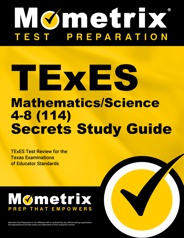
Registration
To register for the Mathematics/Science 4-8 exam, you must create an online NES account via their website. Once your account has been created, you can use it to register for the exam and schedule an exam date.
When you register, you will need to pay the $116 examination fee.
Test Day
You should arrive at the testing center 15-30 minutes before your scheduled appointment to allow enough time for the check-in process. Once you arrive, you will be asked to sign in and present one form of valid, government-issued photo ID.
After the check-in process, you will be asked to leave all personal items (phone, keys, wallet, etc.) in a locker outside the testing area.
Once you enter the testing room, you will be asked to sign an NDA, and you will be given a brief tutorial on the testing system. Once the tutorial is complete, the exam will begin.
How the Exam is Scored
The TExES Mathematics/Science 4-8 exam is scored on a scale of 100-300.
To pass the exam, your final scaled score must be 240 or higher.
Check out Mometrix's Flashcards
Get complex subjects broken down into easily understandable concepts
Get Your Flashcards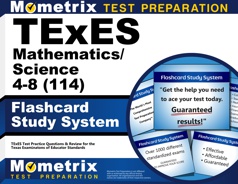
FAQs
Q
How many questions are on the TExES Mathematics/Science exam?
A
There are 120 selected-response questions on the exam.
Q
How long is the TExES Mathematics/Science exam?
A
The time limit for the exam is 4 hours and 45 minutes.
Q
What is the passing score for the TExES Mathematics/Science exam?
A
To pass the exam, you must achieve a minimum scaled score of 240.
Q
How much does the TExES Mathematics/Science exam cost?
A
The examination fee is $116.
Mometrix Test Preparation is not affiliated with or endorsed by any official testing organization. All organizational and test names are trademarks of their respective owners.
